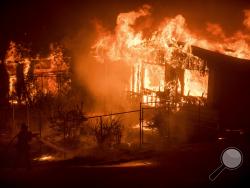OROVILLE, Calif. (AP) — Wildfires barreled across the baking landscape of the western U.S. and Canada, forcing thousands of residents to flee and destroying homes.
Here's a look at the wildfires tearing through the West.
CALIFORNIA
Two major wildfires in California have forced nearly 8,000 people out of their homes.
About 4,000 people evacuated and another 7,400 were told to prepare to leave their homes as fire swept through grassy foothills in the Sierra Nevada, about 60 miles north of Sacramento, the California Department of Forestry and Fire Protection said Sunday.
The fire has burned nearly 4 square miles (11 sq. kilometers), injured four firefighters and destroyed at least 10 structures, but that number is expected to rise, fire spokeswoman Mary Ann Aldrich said.
The area burning was southeast of Oroville, where spillways in the nation's tallest dam began crumbling from heavy rains this winter and led to temporary evacuation orders for 200,000 residents downstream.
"It leaves you feeling like you can't catch a break," said Sharon Reitan, who sought shelter at an evacuation center with her boyfriend Sunday night.
They were in Oroville on Friday afternoon when the fire broke out and roads to their hillside home were blocked. They later saw photographs of their home burned to the ground.
"The road that we live on was hit hard," Reitan said. "We're in shut down mode right now, it's so devastating."
The fire was 20 percent contained. It was one of 14 wildfires across California that about 5,000 firefighters battled Sunday.
In Southern California, at least 3,500 people evacuated as two fires exploded in size at separate ends of Santa Barbara County and a third one threatened homes near a town in San Luis Obispo County.
One of the fires grew to 12 square miles (31 square kilometers), traversing a mountain range and heading south toward coastal Goleta.
There was minimal containment, and flames shut down State Route 154, which is expected to remain closed for days. At least 20 structures burned, but officials didn't say if they were homes.
The fire broke out near a campsite and sent hundreds of campers scrambling, including about 90 children and 50 staff members at the Circle V Ranch who had to take shelter until they could be safely evacuated.
Amayah Madere told KCBS-TV she was in the pool when a counselor told the children to get out and change in a hurry. She said they waited in a dining hall while firefighters fought the fire and the counselors sprayed down the area with water.
"I prayed that if I didn't die I would go to church, and right when I prayed the firefighters came," Madere said.
Crews were also using an air attack against another blaze about 50 miles north that exploded in size to 37.5 square miles (97 square kilometers). About 200 rural homes east of Santa Maria were evacuated after the fire broke out Saturday and was fed by dry gusts.
Some of the firefighters working to contain that blaze were sent to nearby San Luis Obispo County when a fire broke out Sunday and threatened numerous structures near the town of Santa Margarita. Officials said the fire burned 340 acres.
ELSEWHERE IN THE WEST
Firefighters have been able to build containment lines around about half the wildfire that forced the evacuation of hundreds of people near Breckenridge, Colorado. The fire has not spread since it broke out Wednesday and was still less than a square mile (about one-third square kilometer) Sunday.
In rural Arizona, fire officials say three homes were among 10 buildings that were burned. The wildfire there has led to the evacuation of the entire town of Dudleyville, about 100 miles (160 kilometers) southeast of Phoenix.
A wildfire burning in near Summer Lake in south-central Oregon has destroyed a hunting cabin and an outbuilding.
In Nevada, fire officials have ordered evacuations for a wildfire that is near the same area where another blaze has already burned for days.
BRITISH COLUMBIA
Firefighters were contending with more than 200 wildfires burning in British Columbia that had destroyed dozens of buildings, including several homes and two airport hangars. The three biggest fires, which have grown in size to range from 9 to 19 square miles (23 to 49 square kilometers), had forced thousands of people to flee.
"We are just, in many ways, at the beginning of the worst part of the fire season and we watch the weather, we watch the wind, and we pray for rain," outgoing Premier Christy Clark told reporters in Kamloops.
Rob Schweizer, manager of the Kamloops Fire Centre, said it had been an unprecedented 24 hours.
"We probably haven't seen this sort of activity that involves so many residences and people in the history of the province of B.C.," he said.

